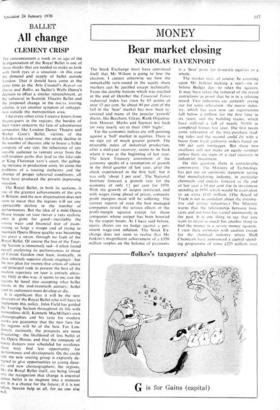BALLET
All change
CLEMENT CRISP
The announcement a week or so ago of the re-organisation of the Royal Ballet is one of those shocks that are needed to make us look with fresh eyes at a situation—in this case the demand and supply of ballet outside London. That it should have come at the same time as the Arts Council's Report on Opera and Ballet, as Sadler's Wells Opera's decision to effect a similar retrenchment, as the upheaval in Scottish Theatre Ballet and the proposed change in the DALTA touring scheme, is yet another sympton of unhappi- ness outside the metropolitan area.
Like every other critic I receive letters from theatre-goers in the regions; the burden of their views concerns the fate of adventurous companies like London Dance Theatre and Walter Gore's Ballet, victims of the Tchaikovsky syndrome; the steady decline in the number of theatres able to house a ballet company of any size; the reluctance of any sizeable audience to venture away from the well-trodden paths that lead to the lake-side or King Florestan xxiv's court, the gallop- ing increase in production costs, let alone the problems of a touring orchestra and the absence of proper rehearsal conditions; all these have produced the present depressing situation.
The Royal Ballet, in both its sections. is one of the greatest achievements of the arts in Britain; and the new dispensation does not seem to mean that the regions will see any appreciable decline in the number of performances. But the idea of a mini-Opera House troupe on tour (never a very realistic one) is gone for good—inevitably the artistic wear and financial tear of main- taining so large a troupe and of trying to maintain Opera House quality was becoming too great a strain, through no fault of the Royal Ballet. Of course the loss of the Tour- ing Section is immensely sad—I often found myself preferring its performances to those at Covent Garden (not least, ironically, in their infinitely superior classic stagings)—but the new plan for twenty-five artists of soloist and principal rank to present the best of the modern repertory on tour is entirely pleas- ing. Only in this way, it seems to me, can the regions be lured into accepting what ballet means in the mid-twentieth century; ballet (and its audiences) must develop or die.
It is significant that it will be the new directors of the Royal Ballet who will have to implement this policy. John Field has guided the Touring Section throughout its life with tremendous skill; Kenneth MacMillan's own choreographies and his taste for modern works are guarantee that the new fare for the regions will be of the best. For Lon- doners, curiously, the prospects are more disquieting: the likelihood of less ballet at the Opera House, and that the company of ninety dancers now scheduled for residence there may find less opportunity for performance and development. On the credit side the new touring group is expressly de- signed to give opportunities to young danc- ers and new choreographers; the regions, like the Royal Ballet itself, are being forced into the recognition that change is essential unless ballet is to stagnate into a museum art. It is a chance for the future; if it is not taken, heaven help us all, for no one else will.






































 Previous page
Previous page